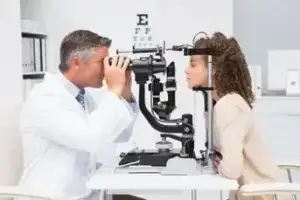* Indicates required field

The pharmaceutical landscape has been shaken by recent developments surrounding Trulicity, a popular medication used to treat type 2 diabetes. A growing number of patients have reported experiencing Trulicity vision side effects after using this drug, leading to the emergence of Trulicity vision loss lawsuits.
Trulicity, manufactured by Eli Lilly and Company, has been a widely prescribed medication for managing blood sugar levels in diabetic patients. However, recent studies and patient reports have raised concerns about Trulicity eye problems, including Trulicity vision loss. As a result, many individuals who have suffered Trulicity and eye problems are now seeking legal recourse through a Trulicity vision loss lawsuit against the manufacturer.
We will examine all of the intricacies of the Trulicity vision loss lawsuit, examining the scientific evidence, legal grounds, and potential outcomes for affected patients from Trulicity and eye problems. We will explore the reported Trulicity vision side effects, the mechanisms by which Trulicity may impact vision, and the steps individuals can take if they believe they have been affected. Additionally, we will discuss who is eligible for a Trulicity vision loss lawsuit and the potential compensation available to those who qualify.
As we navigate through this complex issue, it is essential to approach the topic with a balanced perspective, considering both the benefits of Trulicity in managing diabetes and the potential risks associated with its use. By providing a thorough examination of the Trulicity vision loss lawsuit, we aim to empower patients with the knowledge they need to make informed decisions about their health and legal options.
If you suffered Trulicity vision loss or other Trulicity eye problems, contact Trulicity vision loss lawyer Timothy L. Miles today for a free case evaluation to see if you are eligible for a Trulicity vision loss lawsuit and potentially entitled to substantial compensation if you qualify for a Trulicity vision loss lawsuit. (855) 846–6529 or tmiles@timmileslaw.com.
Trulicity, known by its generic name dulaglutide, is a medication that has gained significant popularity in the treatment of type 2 diabetes. Developed and marketed by Eli Lilly and Company, this injectable prescription drug belongs to a class of medications called glucagon-like peptide-1 (GLP-1) receptor agonists. To fully grasp the implications of the Trulicity vision loss lawsuit, it is crucial to first understand the drug’s intended purpose and mechanism of action.
Trulicity works by mimicking the effects of a naturally occurring hormone in the body called GLP-
1. This hormone plays a vital role in regulating blood sugar levels by:
By enhancing these natural processes, Trulicity helps patients with type 2 diabetes maintain better control over their blood glucose levels.
Like all medications, Trulicity can cause side effects. The most commonly reported side effects include:
While these side effects are generally mild to moderate and often subside over time, it is important to note that more serious side effects, including Trulicity vision loss, have been reported by some patients who took Trulicity and suffered vision loss. These reports have led to increased scrutiny and the emergence of the Trulicity vision loss lawsuit.
Understanding the intended use and benefits of Trulicity provides essential context for examining the legal challenges now facing its manufacturer. As we further examine the Trulicity vision loss lawsuit, it becomes clear that balancing the drug’s benefits against its potential risks is a complex issue that requires careful consideration.

The Trulicity vision loss lawsuit has gained momentum due to an increasing number of reports linking the Trulicity and vision loss. While the drug’s label has long listed some vision changes as potential side effects, recent studies and patient experiences have raised concerns about more severe and potentially permanent vision problems. This section explores the emergence of these Trulicity vision side effects and their impact on patients and the medical community.
Patients taking Trulicity have reported a range of Trulicity vision problems, some of which were not initially listed as potential side effects. These problems include:
It is important to note that while some of these symptoms may be temporary and resolve on their own, others have been reported to persist or worsen over time, leading to significant concerns among patients and healthcare providers. In fact, numerous patients have reported that they took Trulicity and suffered vision loss.
If you took Trulicity and suffered vision loss you may qualify for a Trulicity vision loss lawsuit and should call Trulicity vision loss lawyer Timothy L. Miles. The call is free and so is the fee unless we win or settle your case so call today and see if you are eligible for a Trulicity vision loss lawsuit. (855) 846–6529 or tmiles@timmileslaw.com.
In addition to Trulicity vision loss, one of the most serious Trulicity vision problems is Nonarteritic Anterior Ischemic Optic Neuropathy (NAION). This condition occurs when blood flow to the optic nerve is reduced or blocked, potentially leading to sudden and permanent vision loss. The link between GLP-1 receptor agonists like Trulicity and an increased risk of NAION has become a central focus of the Trulicity vision loss lawsuit.
Key points about NAION in relation to Trulicity:
The Trulicity vision loss lawsuit is grounded in a growing body of scientific evidence suggesting a potential link between the medication and various Trulicity vision problems. One recent study published on July 3, 2024, in JAMA Ophthalmology, indicates a link between GLP-1 receptor agonists and an increased risk of developing NAION. The study observed whether GLP-1 medications were associated with an increased risk of NAION in type 2 diabetes or overweight/obese patients. The researchers concluded that there was a higher risk of NAION in patients prescribed GLP-1 compared to those on non-GLP-1 RA medications but that further studies were warranted to assess causality. The study was the first to report an association between GLP-1 and NAION.
This section examines the key studies, clinical data, and expert opinions that form the basis of these legal claims. Understanding the scientific evidence is crucial for evaluating the merits of the Trulicity vision loss lawsuit and the potential risks associated with Trulicity use.
Initial clinical trials for Trulicity did not reveal significant Trulicity vision problems. However, post-marketing surveillance and long-term follow-up studies have provided new insights:
Researchers have proposed several mechanisms which might contribute to Trulicity vision problems:
If you took Trulicity and suffered vision loss or other serious Trulicity vision problems, including, but not limited to:
Then you may be eligible for a Trulicity vision loss lawsuit and potentially be entitled to significant compensation. Call Trulicity vision loss lawyer Timothy L. Miles today who can tell you if you are eligible for a Trulicity vision loss lawsuit and explain how a Trulicity vision loss lawsuit works. (855) 846–6529 or tmiles@timmileslaw.com.
When faced with a potential lawsuit related to Trulicity and vision loss, it is crucial to have a skilled and experienced Trulicity vision loss lawyer on your side. These legal professionals possess the necessary knowledge and experience to navigate the complex legal landscape and ensure your rights are protected. Here are some of the key reasons why hiring a skilled Trulicity vision loss lawyer is essential:
Comprehensive Understanding of Trulicity and Its Potential Side Effects: A knowledgeable Trulicity vision loss lawyer will have a deep understanding of the medication, its mechanism of action, and the scientific evidence linking it to conditions like NAION. This knowledge is crucial in building a strong case and advocating for your rights.
If you are eligible for a Trulicity vision loss lawsuit, a successful plaintiff is entitled to compensatory damages which would include compensation for things such as:
If your case proceeds to trial it is also possible the court could impose punitive damages, intended to punish the defendant for their actions. Contact Trulicity vision loss lawyer Timothy L. Miles who can tell you if you are eligible for a Trulicity vision loss lawsuit and can explain more about the type of damages you are entitled to receive. (855) 846–6529 or tmiles@timmileslaw.com.

It does not cost anything to hire a Trulicity vision loss lawyer if you are eligible for a Trulicity vision loss lawsuit. We take all cases on a contingency basis which means we do not get paid unless we win or settle your case. A Trulicity vision loss lawyer can explain the process of a Trulicity vision loss lawsuit and answer any questions you may have free of charge, so contact Timothy L. Miles today for a free case evaluation and see if you are eligible for a Trulicity vision loss lawsuit. (855) 846–6529 or tmiles@timmileslaw.com.
If you were prescribed Trulicity and took it as directed and suffered Trulicity vision loss or other Trulicity eye problems, contact Trulicity Vision Loss Lawyer Timothy L. Miles today. You could be eligible for a Trulicity Vision Loss lawsuit and potentially entitled to substantial compensation.
The call is free and so is the fee unless we win or settle your case, so give a Trulicity Vision Loss Lawyer a call today and see if you qualify for a Trulicity Vision Loss Lawsuit. (855) 846–6529 or tmiles@timmileslaw.com.
* Indicates required field
Please correct the highlighted fields